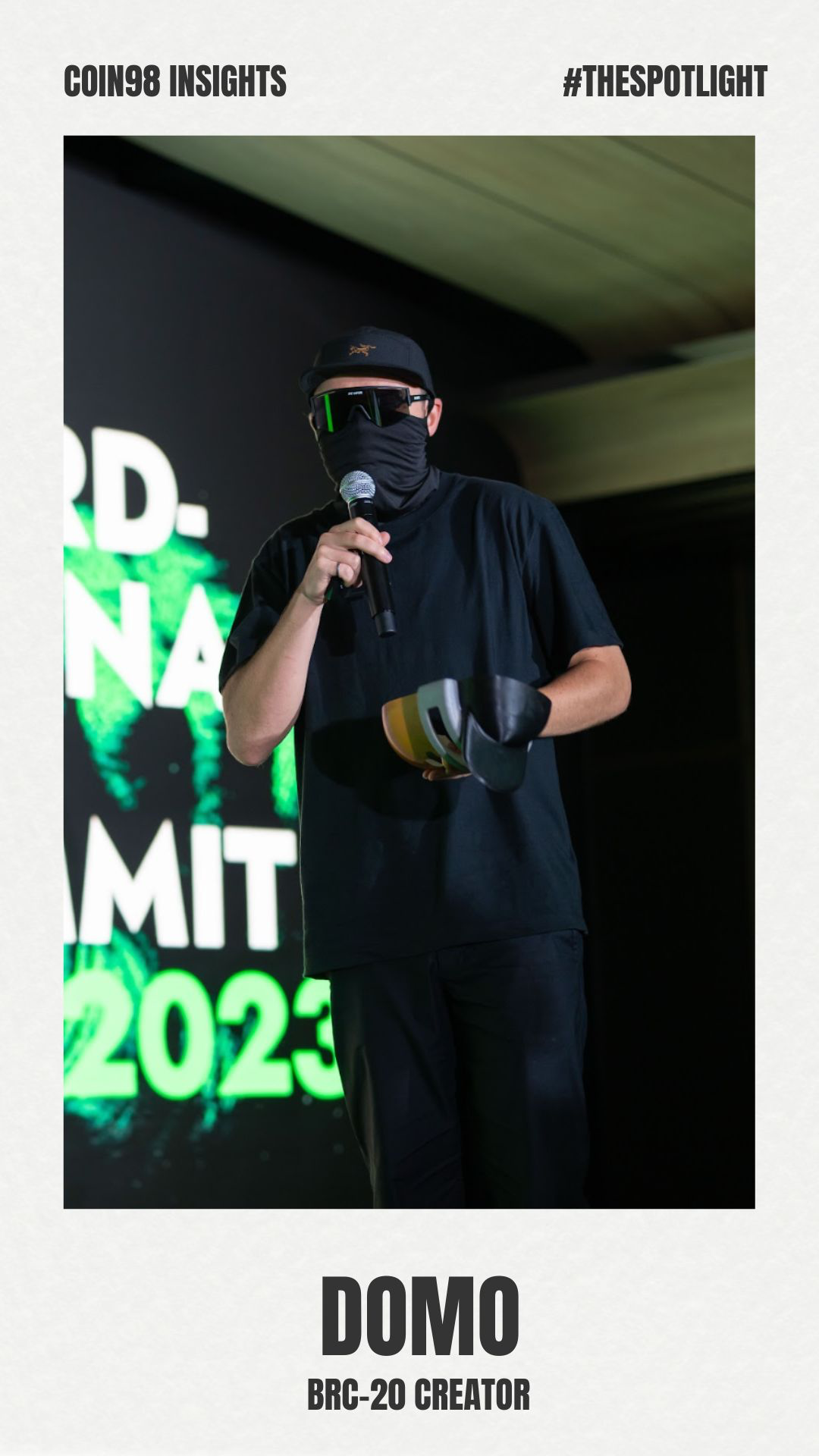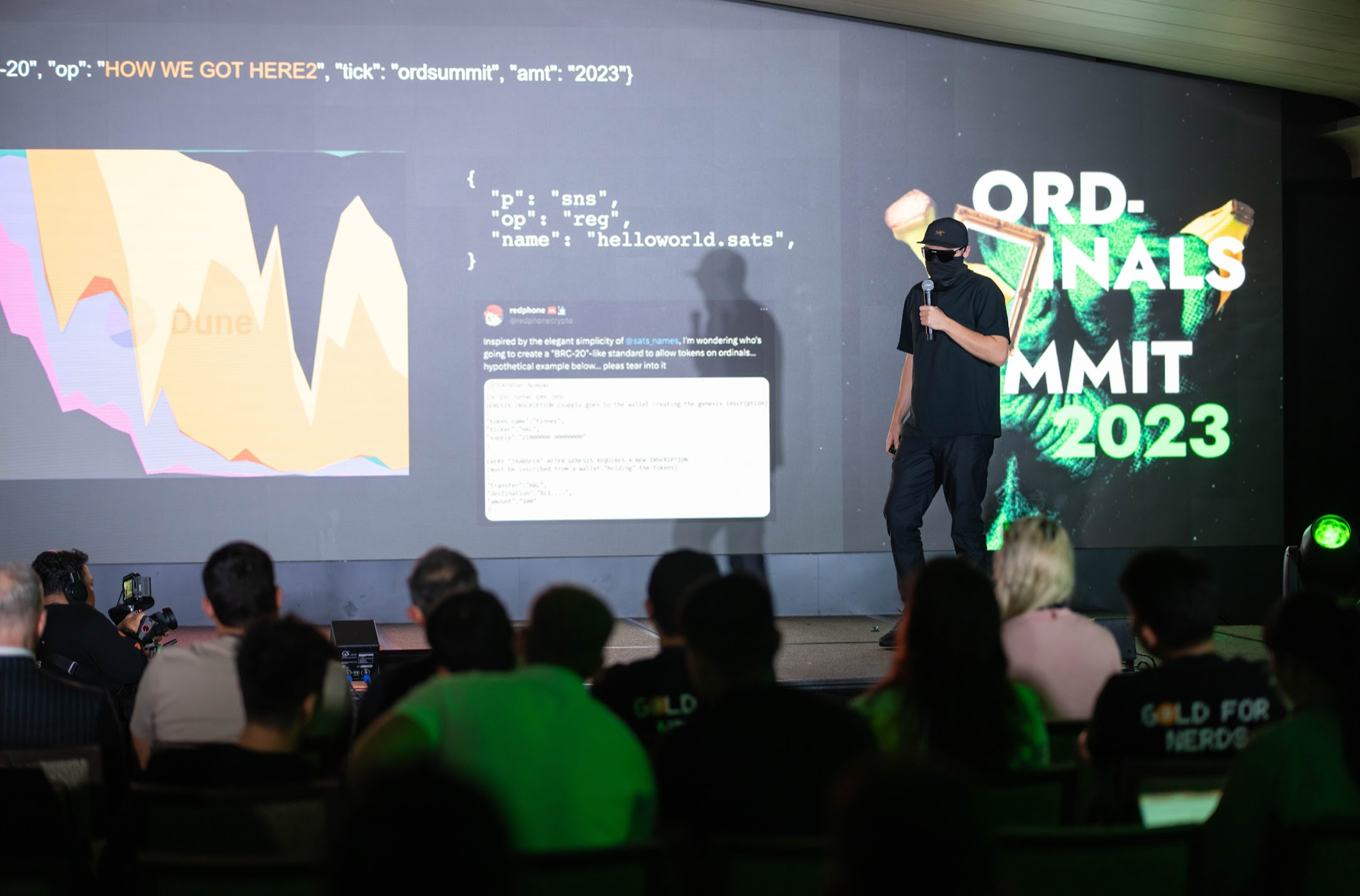Domo: 'Someone stopped me and called me Bitcoin Oppenheimer'

J. Robert Oppenheimer, known as the father of the atomic bomb and the inspiration for the blockbuster film by Christopher Nolan, has always been controversial throughout history. In the narrower and less impactful Web3 space, there's a figure dubbed "Bitcoin Oppenheimer": Domo, the pseudonymous creator of the BRC-20 standard.
In the Bitcoin Ordinals communities, two opposing opinions exist about what Domo has been doing with the Bitcoin network: some see him as a savior, while others view him as a sinner.
Domo himself remains rather reticent about his own persona.
On the internet, there are no interviews about Domo, which is somewhat unusual in the crypto space, where famous personalities often use the media to gain visibility.
Domo's visibility to the common user is virtually nil. Online, he goes by an avatar of a figure shaped by blurred blocks, and on the stage, he is a "ninja" dressed in all black.

When asked about the reason behind his low profile, Domo stated: "This is a space with a lot of toxicity, so I don't want to bridge my crypto world with my real-life world."
In real life, Domo doesn't discuss much about himself either. In an interview with Coin98 Insights at the Ordinals Summit event in Singapore, he answered 15 questions in about 15 minutes with composure, precision, and clarity. He refused to be filmed or photographed or to answer any personal questions. Only occasionally, he smiled quietly when talking about his brainchild, BRC-20.
The Spotlight is a series of conversations between Coin98 Insights and industry builders about hot topics in the market.
Read more: Chiliz, fan tokens, and the story behind Messi's transfer to PSG

- Some people assumed that you initially created BRC as a sort of joke. Could you share the entire story behind its inception?
Domo: I wouldn't say it is a joke, but I'll leave it at that. I definitely didn't have the ambitions that it resulted in. My main goal of BRC-20 was, at the time, trying to grow my brand and then get on-chain, primarily through Dune.
I had been at this point making some dashboards for ordinals and Sats names of ordinals marketplaces. I thought there was an opportunity to make a cool dashboard demonstrating an experiment that was fungible in Bitcoin. So that's the origin.
- In a rare audio about you on YouTube, you mentioned that there is a group of people who like ordinals but are against BRC-20. Can you shed more light on this opinion?
Domo: Bitcoin Maxis, of course, don't like BRC-20 because they don't like anything, so I don't pay any attention to them. But I had a hard time getting to grips that there are people who love ordinals but don't love BRC-20.
That's fine enough. You can like what you want. But I would like to say to those people, especially the ones that have preferences for other fungible protocols on Bitcoin, they should be looking at why BRC-20 succeeded. While BRC-20 might not be the most technically complex solution, these other solutions have a lot to learn from it in terms of accessibility and simplicity.
- What are the common misconceptions or misunderstandings about BRC-20?
Domo: I think one misconception can be that at the start, people, especially on the Bitcoin Maxis side, thought I was some Mossad agent trying to take down Bitcoin, which is crazy. It is just an experiment.
Another misconception is that there is a massive space for improvement. If I were to redo BRC-20 tomorrow, I would not change much, maybe just a couple of things here and there. I think for whatever reason, luck or just my thinking at the time, I really quite like the design of BRC-20.

If I were to redo BRC-20 tomorrow, I would not change much, maybe just a couple of things here and there.
- Some people even suggested censorship of BRC-20 transactions. What do you think about this?
Domo: I went to a meetup in my hometown, and one of these people stopped me and quite aggressively called me Bitcoin Oppenheimer, which I thought was quite hilarious.
One of these people stopped me and quite aggressively called me Bitcoin Oppenheimer, which I thought was quite hilarious.
If I go back to the two groups of people who don't like BRC-20, these people are primarily in that Bitcoin Maxis bubble, and I don't really pay much attention to them. They're just an echo chamber that follows what the podcasters are saying and doesn’t have a whole lot of independent thought themselves.

- The fact that you are here at the Ordinals event in Singapore shows that you pay attention to this market. Do you have any plans to increase the popularity of BRC-20 in Asia in general and Vietnam in particular?
Domo: From the early days, based on the comments on my tweets, I noticed that a large majority of my followers were Asia-based. China, Vietnam, and other places across Asia. I love how much the Asian market has embraced it.
I think Bitcoin Maximalism is very much a Western concept and much of the Asian market has had fun and enjoyed the changes we have seen.
As for my future plans, my strategy so far is just to continue delivering where I can and then let the product speak for itself.
- What about future plans for BRC-20?
Domo: I've been talking a lot about the balance of indexing and governance. I think many people realized that it would not be in the best interests of anyone if I were just to snap my fingers and make arbitrary decisions for the standard.
So for the last couple of months, I've been doing everything I can to put the building blocks in place so the standard can evolve. I say "evolve" because I don't think it's reasonable to expect a whole crazy new standard.
Regarding those two building blocks, I would say that the indexing side is getting more robust with more people running it. Then for me, I’m working with Alex, who has been great in creating basically a Bitcoin BRC-20 Oracle that both validates these indexes against each other and then tests the chain, staying on-chain at regular intervals.
The governance, which again goes hand-in-hand with indexing, is initiative. I launched, with Oyl, the Layer 1 Foundation (L1F.xyz), whose idea is that it's a front page for metal protocol discourse. So not only BRC-20 but whatever standard wishes to host their discourse on this platform is more than welcome.
This collaboration will push the space forward rather than into siloed discussions. I think if it's all in one open place, the best standard will win out, maybe that will be BRC-20, maybe something else. Who knows?
- What is the specific role of indexes with BRC-20 and why do we need them in the long term?
Domo: The way I see public indexes is that they’re similar to inscription tools that allow people to set up their own node more easily or, in the case of BRC-20, to calculate the state themselves whichever way they see fit.
Basically, an index is a way to calculate the state at any given time. What I mean by state is the balance of the people that are participating in the network. There is an unusual thing with BRC-20 which I think people don't realize. The indexes are going under the hood with the chain they're using. So with Ethereum, the indexing is baked into the Ethereum Virtual Machine itself, but with BRC-20, as a matter of protocol, the indexing occurs externally.

- In addition to BRC-20, we have seen the emergence of many other new standards like ORC-20, SRC-20, RECURSIVE, and CURSE. What do you think about this?
Domo: If you look at my GitBook when I launched BRC-20, you can see I said that this is an experiment and by all means, please go out and experiment and do your own standards.
In my presentation today, I had a chart that showed the market share of the ordinals marketplace over time. I think it should be up to the users to choose whatever the best standard is.
I hope that's BRC-20. And if it's not, the one thing I would hope is that they're compatible, that there's some way to bridge between those standards.
- What do you think about the “Bitcoin narrative”? Will ordinals projects being built on the Bitcoin network continue to grow in the future?
Domo: I'm by no means a Bitcoin Maximalist. I'm a multichain person and enjoy a variety of chains. I think what brought me to ordinals was just the massive value of the mother chain Bitcoin. It's there forever. It’s uncensorable.
So I think ordinals are inevitable in any way, shape, or form.
- By remaining pseudonymous, you give the impression of being a somewhat eccentric developer who separates himself from the community. What do you think about this?
Domo: I'm a data scientist at best, probably more of a data analyst. I'm definitely not a developer. If anything, I’m a LARP (pretend) dev. So I think it is a misconception that I’m a super shadowy coder.
I want to take a different route and just continue working slowly and surely to make the best product.
As for the reason I don't reach out to the community, I think at the end of the day, I'm running a standard here. It's not a project. So I think it doesn't make sense to hype things up and do the classic crypto thing, which is to over-promise and under-deliver.
I want to take a different route and just continue working slowly and surely to make the best product.
- During the time you created BRC-20, do you have any memorable moments you would like to share?
Domo: Some memorable moments. Like when I created BRC-20, I spent most of my time creating the proof of concept indexer, which broke within the first 15 minutes. That was kind of a disaster.
Then 15 minutes after that, someone DMed me saying that BRC-20 was broken, but they were wrong. Then that following weekend, everyone was telling me BRC-20 was broken. That was the same week when USDC depegged from the US dollar. So I would say that was probably the most stressful weekend of my life.
Fortunately, both things turned out okay. Happily, BRC-20 is still moving in a positive direction.